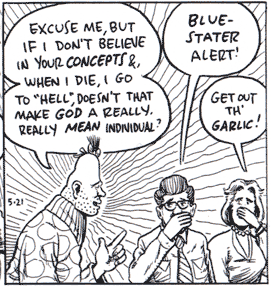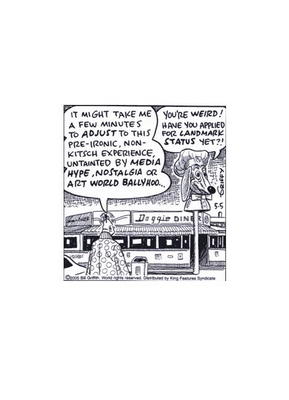 Bill Griffith's "Zippy the Pinhead" is an island of inky goodness in a mediocre sea. The great daily strips took a mortal blow when newspapers started to shrink the panels, and the loss of a generation of highly-literate creators probably finshed them off, but Griffith soldiers on. I still miss the Zippy t-shirt I wore in the 80's: "If you can't say something nice, say something surrealistic."
Bill Griffith's "Zippy the Pinhead" is an island of inky goodness in a mediocre sea. The great daily strips took a mortal blow when newspapers started to shrink the panels, and the loss of a generation of highly-literate creators probably finshed them off, but Griffith soldiers on. I still miss the Zippy t-shirt I wore in the 80's: "If you can't say something nice, say something surrealistic." This is the world that
This is the world in which our minds are drowning, held under by the likes of Karl Rove, Jerry Bruckheimer, and the 24 hour news cycle. Why do we regulate guns, tobacco and alcohol but not PR firms? Zippy navigates these waters with little regard for the weather, and when you find yourself overwhelmed, his babbling voice will lead you through the fog.
Here is Griffith's own description of Zippy, from his webpage:
"Zippy is the "wise fool". He knows nothing at all and everything at once. Media-soaked, he has the attention span of a channel-surfer. He’s giddy from information overload. He speaks in an expressive voice, full of emotion and media sound bites. His mind works in a distinctly non-linear fashion, leap-frogging from one thought to the next , creating a speech pattern that closely resembles the swing of improvisational jazz.
 Though his behavior may appear "surreal", he’s really making his own kind of sense of the world. His seeming "non sequitur" style is really more of a rearranging of subjects, objects and emotions, flowing like poetry. Zippy thrives on an additive-rich, high MSG diet and a hefty dose of celebrity-spotting (after all, he lives in Hollywood). He’s fueled by Ding Dongs and taco sauce. Of course, there’s an intentionally satiric edge to Zippy, but this never takes a back seat to his strong attachment and loyalty to those around him. When he’s not hanging out at Donut Hut, the bowling alley or the laundromat, he lives with his family in a courtyard apartment building a few blocks from Hollywood Boulevard. When he wants to get away from it all, he goes to his fur-lined fallout shelter in an vacant lot on the other side of town. He’s the central character of the show, bouncing around inside each episode, both reacting to and directing (often unwittingly) the storyline."
Though his behavior may appear "surreal", he’s really making his own kind of sense of the world. His seeming "non sequitur" style is really more of a rearranging of subjects, objects and emotions, flowing like poetry. Zippy thrives on an additive-rich, high MSG diet and a hefty dose of celebrity-spotting (after all, he lives in Hollywood). He’s fueled by Ding Dongs and taco sauce. Of course, there’s an intentionally satiric edge to Zippy, but this never takes a back seat to his strong attachment and loyalty to those around him. When he’s not hanging out at Donut Hut, the bowling alley or the laundromat, he lives with his family in a courtyard apartment building a few blocks from Hollywood Boulevard. When he wants to get away from it all, he goes to his fur-lined fallout shelter in an vacant lot on the other side of town. He’s the central character of the show, bouncing around inside each episode, both reacting to and directing (often unwittingly) the storyline." (And some days it takes more Stones than others...) Where Mythical Bestiary meets Contemporary Culture and Chews On Its Leg Until Covered with Slobber.
(And some days it takes more Stones than others...) Where Mythical Bestiary meets Contemporary Culture and Chews On Its Leg Until Covered with Slobber.
2 comments:
Yep I'm a Zippy fan, and catch him on Sundays ---but the one I miss is "Calvin and Hobbes". Only a midwesterner can understand the snowmen sculptures and want them for their own front yard.
I'm a rare find as I like to read books and only turn on the tube for weather and movies. Its so annoying to watch the same ads repeat every 10-15 minutes. I'm not going to buy it! especially with it rammed into my eyes and ears (notice how at night the volume goes up on the commercials?)
Smile, Dee Ann
From an interview with Robert Stone by Robert Birnbaum at http://www.identitytheory.com/interviews/birnbaum106.html
RB: What’s your take on, for lack of less cliched phrase, the literary culture …more people want to be writers, apparently there are more readers?
RS: I was in KGB [a bar and reading venue in Manhattan] last night and I think it's very vital, even more vital than it used to be. A lot of people are even interested in publishing, in a way. Certainly interested in writing novels. The novel experience is going to be really special in this kind of crazy —you have to go somewhere to get away from the crazy media confusion. You have to go to the quiet of language, of traditional language, to make it mean sense. I don't think this stuff is going to replace reading. On the contrary, reading is going to be more valuable.
Post a Comment